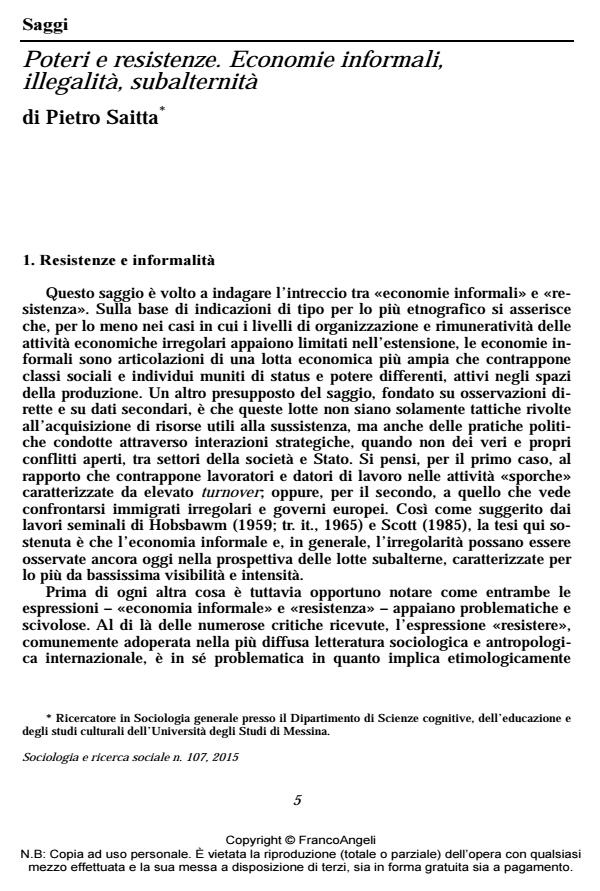Poteri e resistenze. Economie informali, illegalità, subalternità
Titolo Rivista SOCIOLOGIA E RICERCA SOCIALE
Autori/Curatori Pietro Saitta
Anno di pubblicazione 2015 Fascicolo 2015/107
Lingua Italiano Numero pagine 22 P. 5-26 Dimensione file 100 KB
DOI 10.3280/SR2015-107001
Il DOI è il codice a barre della proprietà intellettuale: per saperne di più
clicca qui
Qui sotto puoi vedere in anteprima la prima pagina di questo articolo.
Se questo articolo ti interessa, lo puoi acquistare (e scaricare in formato pdf) seguendo le facili indicazioni per acquistare il download credit. Acquista Download Credits per scaricare questo Articolo in formato PDF

FrancoAngeli è membro della Publishers International Linking Association, Inc (PILA), associazione indipendente e non profit per facilitare (attraverso i servizi tecnologici implementati da CrossRef.org) l’accesso degli studiosi ai contenuti digitali nelle pubblicazioni professionali e scientifiche.
The essay explores the links between «informal economies» and the concept of «resistance». The author argues that the illegalities of the marginal classes should be looked at through their connection to those of the élite classes and the Government. Within this framework, the informal economy is both the outcome of a set of material conditions aiming at the subordinated inclusion of entire classes of citizens, and a sign of the desire of those citizens to evade the limits imposed on them by legislations and social hierarchies. In contrast with the dominant rhetoric on public order, informal economy is seen in this context as a particular area of engagement and effort of the «marginals» aimed to create paradoxical forms of inclusion
- A critical assessment of informal practices as resistance: the case of birzha in Georgia Costanza Curro, in Caucasus Survey /2017 pp.65
DOI: 10.1080/23761199.2017.1280949 - Migration and Domestic Space Enrico Fravega, pp.153 (ISBN:978-3-031-23124-7)
- Informal Cities: Peruvian Migration, Textile Workshops and Urban Space in Argentina María José Magliano, María Victoria Perissinotti, in SOCIOLOGIA DEL LAVORO 146/2017 pp.89
DOI: 10.3280/SL2017-146006
Pietro Saitta, Poteri e resistenze. Economie informali, illegalità, subalternità in "SOCIOLOGIA E RICERCA SOCIALE " 107/2015, pp 5-26, DOI: 10.3280/SR2015-107001